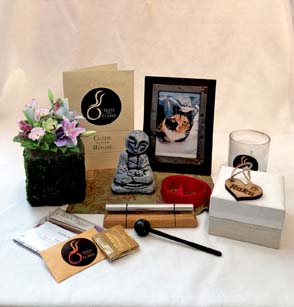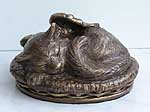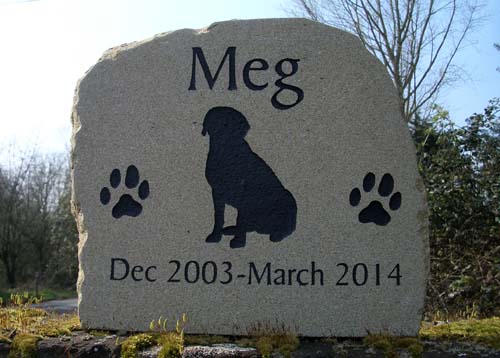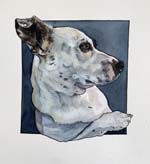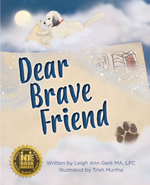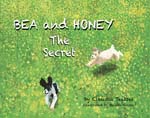See Moira Allen's recent video interview on pet loss!
The Moment After: Surviving Pet Loss
by Moira Anderson Allen, M.Ed.
The world has just ended. Your pet -- your friend, your confidante, the companion who was always there for you -- has died. Dog, cat, horse, bird, hamster, ferret -- species doesn't matter. Age doesn't matter. All that matters is the huge hole that has just entered your life. That, and the grief.
Conventional wisdom suggests that I devote this column -- call it "the moment after" column -- to tips on how to start feeling better. But if your pet has died within the past few hours or days, you may not be able to even imagine feeling better. You may be wondering how you can even survive. You may also not want to feel better. Painful as it is, that ragged, miserable hole may seem all you have left of your pet, and you may not want to get rid of it just yet. The thought of "feeling better" too quickly may actually seem disrespectful. You may feel that you owe your pet a period of grief, of pain. "Feeling better" may seem a lot like "letting go," and you may not be ready to do that yet.
That's OK. Grief and mourning aren't some sort of awkward, embarrassing mental lapses that should be "gotten over" or "healed" as soon as possible. In reality, grief is our final expression of love, the last gift we have to offer. It isn't to be rushed. Instead of trying to "get over it," we must find ways to "get through it" -- and that can take awhile.
So, for this first column, I'm not going to talk about how to "heal." I'm going to talk about how to survive.
Ten Ways to Hang On
When you face that huge emptiness inside, it's tempting to just give yourself over to grief. At the same time, a certain amount of survival instinct reminds you that you still need to do something to keep going. But what? Grief makes it hard to think, to plan. What can you do to keep that hole from swallowing you?
1) Eat something. You may not feel hungry, but food is important. Grief burns a lot of energy; you need fuel. Eat something that makes you feel good -- and if that happens to be a huge slice of chocolate cake, well, this is no time to worry about your diet. Me, I like tomato soup; it reminds me of sitting warm and snug by a fire while the rain beats on the windows. If you can't face a full meal, nibble. Eat now, whether you want to or not.
2) Cry. Cry as much as you want to, whenever you feel like it. Take the day off from work. If you can spend even one day crying whenever you need to, it will make it much, much easier to face the next day.
3) Find something to do. This may seem trite, but focusing on a task really does help. Finding a project to complete, a task to accomplish, helps you focus on the world (and the "you") that exists outside that hole. It's not a distraction, and it won't make your grief go away. It simply helps you adjust your perception, to recognize that while grief is part of your life, it isn't the sum total of your life.
4) Count your blessings. When you lose a loved one, it's hard to focus on anything positive. Unless your circumstances are truly dreadful, however, chances are that your pet was not the only good thing in your life. Remind yourself of some of the good things that you still have by deliberately reviewing a list of your "blessings" -- such as your family, your remaining pets, your friends, your interests. Review them in your head, or write them down. Again, these don't fill the hole -- but they do remind you that there is a world outside that hole, and that you are still part of it.
5) Reflect on things that don't involve your pet. The loss of your pet may seem to touch every aspect of your life, but in reality, it hasn't changed everything. Reflect on the things it hasn't changed -- the things that you did and enjoyed without your pet. When my cat died of cancer, I forced myself to remember that "The loss of my pet doesn't take away my ability to enjoy long talks with my husband. It doesn't take away my ability to write. It doesn't take away my ability to read a good book. It doesn't take away my ability to create beautiful things. It doesn't take away my ability to enjoy a long walk on the beach..." Focus on those things that your pet didn't "touch" while it was alive -- and you'll be reminded of the things that haven't really been "touched" by its death.
6) Cuddle something furry. If you have another pet, give it some extra cuddle time -- even though part of your mind is thinking that this isn't the pet you want to cuddle. It's still warm, and furry, and may be very confused and concerned right now. If you don't have another pet, consider cuddling a stuffed animal. Spouses are nice, but you need fur. Curl up in bed with a stuffed animal and a heating pad; it's lots better than lying in the dark wishing you had something furry to touch.
7) Avoid irrevocable decisions. Don't do anything you can't undo. For example, if you can't stand the sight of your pet's toys, don't throw them away -- put them out of sight. A week or a month from now, you may wish you had them again, perhaps to incorporate into a memorial, and you'll bitterly regret any hasty actions that can't be undone. Similarly, don't rush out and get a new pet until you've had time to think.
8) Replace negative imagery. The last moments of your pet's life can become a powerful image -- whether you witnessed them or not. Unless you want that image to overwhelm your positive memories, start working on replacing it with something more pleasant. If you believe that pets go on to an afterlife, for example, try replacing the image of the "last" moment of your pet's life with the "next" moment: The moment it arrives, healthy and whole, on the other side. What happens then? Who greets it? What does it do? Fill your mind with "the moment after." If you don't believe in an afterlife, concentrate on the special things you did for your pet to make this life a blessing for it.
9) Be honest with yourself. You've been wounded, and you hurt. You're not weak, crazy, or overly sentimental to feel this way. Even if you have to put on a "brave face" for the rest of the world, don't try to fool yourself into thinking that you're not really in all that much pain. If you cut your hand off, it wouldn't help to get angry with yourself for bleeding -- and losing your pet is a lot like losing a part of yourself. You will hurt, and it will take time to heal.
10) Make a decision to work through grief. You've heard the saying, "Time heals all wounds." That isn't true. Time doesn't heal all physical wounds (try cutting off your hand and just ignoring it!) -- and it doesn't heal all emotional wounds either.
I've met people whose grief has persisted for years: They're just as upset, just as angry, just as miserable over their loss as they were the day it happened. Such people tend to be consumed with bitterness, obsessing over their loss -- and not only do they suffer, but they also bring suffering to everyone around them.
Grief is normal, but it is also seductive. It's very tempting to let it "take over." Before you do, think about how you feel today, and ask yourself if you want to feel exactly the same way in six months, or a year.
Notice that I'm not asking you to decide how you want to feel today. Today, you may not have much choice -- any more than you could choose not to feel pain if you were physically injured. Your decision about how to manage that injury, however, would be crucial in determining whether, a year from now, you are healed -- or crippled.
The same is true of grief. You can't control whether or not you grieve. But you can decide whether or not to let that grief control you. And these ten "survival steps" are a good way to ensure that it doesn't!
Copyright © 2001 by Moira Allen. This column originally appeared on Allpets.com.
| Please visit our Handouts and Reprints page for information on distributing this information as a brochure or text handout. |
When a pet dies, you want help... fast!
You'll find it in Moira Allen's Coping with Sorrow on the Loss of Your Pet. In a book filled with comfort, compassion and support, you'll find the tools and tips you need to:
 |
- Understand the feelings you're going through -- and find ways to ease the pain
- "Say good-bye" with memorials, tributes and other coping strategies
- Help your children and other family members deal with their grief
- Deal with people who "just don't understand"
- Help surviving pets cope with the loss of a missing companion
- Come to terms with the guilt we so often feel when a pet dies
- Handle the agonizing decision of euthanasia
- Choose the best and most comforting "final resting place" for your pet
- Determine when and how to bring a new companion into your home (how soon is too soon?)
- Improve your chances of recovering a lost or stolen pet
- Help a friend cope with loss
|
Coping with Sorrow on the Loss of Your Pet celebrates over 30 years in print -
our expanded Third Edition is available from Amazon.com in Print and Kindle editions!*
*(Please note that these are affiliate links. As an Amazon Associate I earn from qualifying purchases.)
Quantity discounts are also available; please visit our Quantity Orders page for details.
|

 HOME ·
HANDOUTS ·
Links ·
Pet Loss Hotlines ·
List Your Organization ·
List Your Product
HOME ·
HANDOUTS ·
Links ·
Pet Loss Hotlines ·
List Your Organization ·
List Your Product